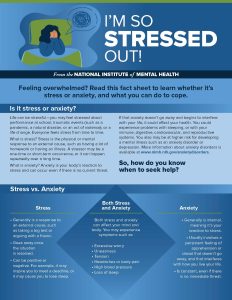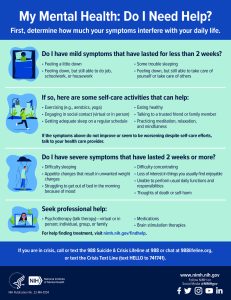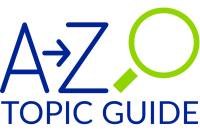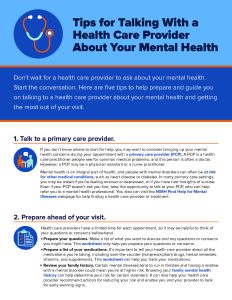Topic-Specific Resources Listed from A-Z
Caring For Your Mental Health
The following article is from the National Institute of Mental Health (NIMH). While this material has been expert-reviewed, it is not NIMH or MHANYS intention to provide specific medical advice. Both MHANYS and NIMH advise readers to consult with a qualified health care provider for diagnosis, treatment, and answers to personal questions.
Overview
Mental health includes emotional, psychological, and social well-being. It affects how we think, feel, act, make choices, and relate to others. Mental health is more than the absence of a mental illness—it’s essential to your overall health and quality of life. Self-care can play a role in maintaining your mental health and help support your treatment and recovery if you have a mental illness.
About Self-Care
Self-care means taking the time to do things that help you live well and improve both your physical health and mental health. When it comes to your mental health, self-care can help you manage stress, lower your risk of illness, and increase your energy. Even small acts of self-care in your daily life can have a big impact.
Here are some tips to help you get started with self-care:
- Get regular exercise. Just 30 minutes of walking every day can help boost your mood and improve your health. Small amounts of exercise add up, so don’t be discouraged if you can’t do 30 minutes at one time.
- Eat healthy, regular meals and stay hydrated. A balanced diet and plenty of water can improve your energy and focus throughout the day. Also, limit caffeinated beverages such as soft drinks or coffee.
- Make sleep a priority. Stick to a schedule, and make sure you’re getting enough sleep. Blue light from devices and screens can make it harder to fall asleep, so reduce blue light exposure from your phone or computer before bedtime.
- Try a relaxing activity. Explore relaxation or wellness programs or apps, which may incorporate meditation, muscle relaxation, or breathing exercises. Schedule regular times for these and other healthy activities you enjoy such as journaling.
- Set goals and priorities. Decide what must get done now and what can wait. Learn to say “no” to new tasks if you start to feel like you’re taking on too much. Try to be mindful of what you have accomplished at the end of the day, not what you have been unable to do.
- Practice gratitude. Remind yourself daily of things you are grateful for. Be specific. Write them down at night, or replay them in your mind.
- Focus on positivity. Identify and challenge your negative and unhelpful thoughts.
- Stay connected. Reach out to your friends or family members who can provide emotional support and practical help.
Self-care looks different for everyone, and it is important to find what you need and enjoy. It may take trial and error to discover what works best for you. In addition, although self-care is not a cure for mental illnesses, understanding what causes or triggers your mild symptoms and what coping techniques work for you can help manage your mental health.
When to Seek Professional Help
Seek professional help if you are experiencing severe or distressing symptoms that have lasted 2 weeks or more, such as:
- Difficulty sleeping
- Appetite changes that result in unwanted weight changes
- Struggling to get out of bed in the morning because of mood
- Difficulty concentrating
- Loss of interest in things you usually find enjoyable
- Inability to perform usual daily functions and responsibilities
Don’t wait until your symptoms are overwhelming. Talk about your concerns with your primary care provider, who can refer you to a mental health professional if needed. If you don’t know where to start, read the National Institute of Mental Health (NIMH) Tips for Talking With a Health Care Provider About Your Mental Health PDF linked below.
What to Do in a Crisis
If you or someone you know is struggling or having thoughts of suicide, call or text the 988 Suicide & Crisis Lifeline at 988 or chat at 988lifeline.org. This service is confidential, free, and available 24 hours a day, 7 days a week. In life-threatening situations, call 911.
Featured Videos
NIMH Expert Discusses Managing Stress & Anxiety: Learn coping techniques to help maintain your mental health during the COVID-19 pandemic and when to get professional help.
GREAT: Helpful Practices to Manage Stress and Anxiety: Learn about helpful practices to manage stress and anxiety. GREAT was developed by Dr. Krystal Lewis, a licensed clinical psychologist at NIMH.
Getting to Know Your Brain: Dealing with Stress: Test your knowledge about stress and the brain. Also learn how to create and use a “stress catcher” to practice strategies to deal with stress.
Guided Visualization: Dealing with Stress: Learn how the brain handles stress and practice a guided visualization activity.
Mental Health Minute: Stress and Anxiety in Adolescents: Got 60 seconds? Take a mental health minute to learn about stress and anxiety in adolescents.
Federal Resources
- NIH Emotional Wellness Toolkit: This NIH toolkit provides six strategies for improving your emotional health.
- NIH Social Wellness Toolkit: This NIH toolkit provides six strategies for improving your social health.
- MedlinePlus: How to Improve Mental Health: MedlinePlus provides health information and tips for improving your mental health.
- CDC: Care for Yourself: The Centers for Disease Control and Prevention (CDC) provides information on caring for yourself.
- CDC: Coping With Stress: CDC provides information on how to cope with stress.
Handouts
 English / Español
English / Español  English / Español
English / Español
Mental Health Association in New York State (MHANYS) has additional resources that can be accessed through its main website. These resources include links to advocacy and policy work, school-based programs, mental health wellness training programs and more.
MHANYS
mhanys.org
Advocacy and Policy
mhanys.org/advocacy-policy
Mental Health Community Partners
mhcommunitypartners.org
CarePath™
mhanys.org/carepath
SMHRT: Family Education
https://www.mentalhealthednys.org/family-education-webinar-series/
Data Source
National Institute of Mental Health: Mental Health Information Health Topics www.nimh.nih.gov/health/topics

